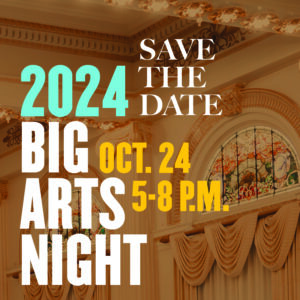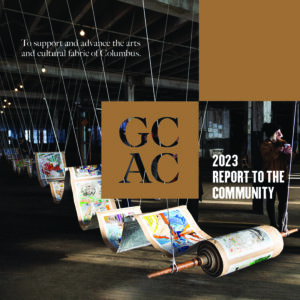2024 Capital Expense
Application Portal
Description
Capital Grant Program
To ensure that sustainable arts and cultural organizations are able to construct and maintain capital assets vital to their mission.
Supported, in part, by the City of Columbus Facility Stabilization Fund, the Capital Grant program offers funding for renovation, expansion or equipping of arts & cultural venues.
Eligibility
In 2024, applications will be accepted from all GCAC Operating Support or General Support grantees from the past two years. Grantees awarded in 2023 ARE eligible to apply, however, total awards for 2023 and 2024 will not exceed the 2024 maximum amounts. Email McKenzi Swinehart (mswinehart@gcac.org) to find out total funding eligibility for 2024.
Organizations requesting building enhancements or renovations to facilities must demonstrate the following building/property responsibilities:
- Ownership of the building/property; OR
- A long-term lease (extending at least ten years from the time of the application) stating your organization is responsible and liable for the capital upgrades and/or leaseholder improvements.
Organizations requesting equipment must demonstrate:
- Access to appropriate storage for the equipment; AND
- A plan and budget for the maintenance for the life of the asset.
What is Capital?
Applicants must propose projects that represent eligible capital improvements, in advanced stages of development. To qualify as a “Capital Improvement,” a project must be a permanent alteration or installation that increases the value and extends the useful life of a piece of real property. This can include the construction of new facilities (must be 90% complete at the time of application), the renovation or restoration of existing buildings, as well as the purchase of fixed assets with a useful life of over 5 years, such as equipment or technology systems.
What types of capital expenses are eligible?
In general, all requests must further a public purpose and be consistent with the mission of the applying organization for the durable life of the improvement of equipment.
- Improvements, repairs, expansions, or renovations for existing buildings.
- Equipment and technology that meets the definition of a fixed asset with a useful life of over 5 years.
- New construction may be considered 90% completed (i.e. the final stages of the construction or equipment for a new facility).
What types of capital expenses are NOT eligible?
- Maintenance or ongoing facility expenses
- New land/building purchases
- Feasibility studies, environmental assessments, or architect drawings
- New building construction in the beginning stages
- Operational or programming expenses, fundraising costs, or legal fees
- Expenses occurring before December 1st, 2024 (i.e. no reimbursements)
NOTE: If you are unsure if your organization or request meets the eligibility requirements, please email McKenzi Swinehart (mswinehart@gcac.org) before starting the application.
How much can we request?
In 2024, the award range for applicants with an average three-year adjusted revenue of under $1 million is up to $250,000; the award range for applicants with an average three-year adjusted revenue of over $1 million is up to $500,000; the award range for equipment-only requests for all budget sizes is up to $100,000. Award amount will depend on submitted project, budget, review committee recommendations and available grant dollars.
Grantees awarded in 2023 ARE eligible to apply, however, total awards for 2023 and 2024 will not exceed the 2024 maximum amounts. Email McKenzi Swinehart (mswinehart@gcac.org) to find out total funding eligibility for 2024.
Are matching funds required?
Yes, all applicants will be required to demonstrate a match, which may include organization funds. Applicants with an average three-year adjusted revenue of over $1 million must demonstrate a 25% match; applicants with an average three-year adjusted revenue of under $1 million must demonstrate a 10% match; applicants requesting equipment only must demonstrate a 5% match. Funds received from GCAC, City of Columbus or Franklin County cannot be used as matching funds.
Timeline
When are applications due?
There is a two-step application process. The Letter of Intent (LOI) is a short initial application; the strongest LOI applicants will be invited to submit a full application.
| Application opens | August 1, 2024 |
| Letter of Intent (LOI) Due (Step 1) | August 30, 2024 |
| Applicants invited to submit full application | September 18, 2024 |
| Full Application Due (Step 2) | October 15, 2024 |
| Applicants Notified | November 25, 2024 |
| Progress Report Due | December 31, 2025 |
| Final Report Due | December 31, 2026 |
Application Questions & Uploads
STEP 1: What are the Letter of Intent (LOI) questions and required uploads?
Below you will find the current narrative and short-answer questions to assist you in your preparation.
- Amount requested
- Total project cost
- Briefly describe your capital expense request. What will GCAC funds be used for?
- What is the compelling need for the capital expense? How will this project benefit your organization and the community?
- Upload: Provide a one-page project overview budget.
STEP 2: Invitation only – what are the Full Application questions?
After the LOIs are reviewed by the committee, selected organizations will be invited to submit a full application. Below you will find the current narrative and short-answer questions to assist you in your preparation.
- How does this capital project or equipment request align with your strategic/artistic plan or program priorities?
- How will this capital project or equipment request improve your ability to serve your audience and hired artists?
- Breakdown the timeline for the project. Who is responsible for each stage of the process?
- How will the organization raise the funds needed to complete the project? Provide a list of pending and committed funding sources, including sources and dollar amounts.
- Equipment requests ONLY: Where will the equipment be stored and how will it be accessed to serve the organization? What is your plan for the maintenance for the life of the asset?
What are the required uploads for the Full Application?
All support materials must be uploaded digitally to the online application system.
Mandatory Supplemental Materials:
- Detailed and itemized project budget – be as thorough as possible.
- Capitalization Policy
- At least 3 bids for the project or equipment/technology requested or a detailed explanation of why multiple bids cannot be obtained.
- GCAC encourages all organizations have a completive bid policy in place as a best practice. Including less than 3 bids may impact funding decision.
- For building enhancements or renovations: organizations need to prove ownership of the facility OR a long-term lease agreement demonstrating a remaining term that is equal to or greater than ten years.
- Renewal options contained in the current lease will be considered, provided such renewal does not require landlord approval or documentation is provided showing proof of approved extension.
Optional Supplemental Materials (include if available and relevant):
- Feasibility studies, architectural drawings, engineering reports, etc.
- Current strategic and/or artistic plan
After Submitting – Reviews & Scoring
LOI Review
Following the deadline, LOIs will be evaluated by the Capital Expense grant review committee to select applicants invited to submit a full application. The strongest applicants will be notified by email and given instruction for completing Step 2 of the process.
Evaluation, scoring and voting
Full applications are reviewed and scored by the Capital Expense grant review committee and later presented to the Board of Trustees for approval. Applications will be assessed in three categories for a maximum of 100 points:
- Demonstration of need & how project addresses the need – up to 20 points
- Community & organizational impact – up to 40 points
- Project planning & fiscal management – up to 40 points
Notification
Grant approvals are based on evaluations and available funding. Following a vote from the Board of Trustees, applicants will be notified by email of the application award status. Emails are sent to the primary grant contact and the organization’s leader. You will receive reviewer/committee notes (if applicable) and a score in the notification email.
After Awarded – Contracts, Payments, Reporting
Grant Agreement
Following the approval of a grant, a grant agreement specifying the terms of the grant will be available in the online application portal by clicking the “Contracts to Complete” button. To accept the award, review the grant agreement and digitally sign by the date indicated. No major changes in the project can then occur, either in activities, key leadership, or finances, without prior written approval from GCAC. Failure to properly notify and/or obtain approval could result in the cancellation of the remaining grant.
Payments & Spending the Funds
Grantees will receive 75% of their grant award following the receipt of a digitally signed Grant Agreement. The remaining 25% will be paid following receipt and approval of the final report. Grantees have up to two years to complete the project; final reports may be submitted early.
For faster and dependable delivery, all payments will be issued through ACH Direct Deposit. To set up, banking information is collected (or updated with changes) as part of the grant agreement and is stored securely.
NOTE: Payments may take up to three weeks to be processed.
Progress & Final Reports
Progress & Final Reports are due as indicated in the timeline above and in the Grant Agreement. To complete your Progress or Final Report, login to the online application system, and click on “Reports to Complete.” Extensions may be requested in writing before the due date. Failure to submit a Progress or Final Report within 60 days of the due date may result in the cancellation of the remaining grant disbursement. Overdue or failure to submit final complete reports may affect eligibility and impact grant awards in future applications.
Publicity Requirements
Publicity/Donor Acknowledgement
Once you are awarded, say “Thanks!” in a public way. GCAC requires that all organizations and artists receiving funding demonstrate the public value of the arts by making others aware of awards received and acknowledging public funders.
Capital Expense grantees should credit GCAC on signage in a visible location related to the capital project. Refer to APPENDIX A for details of contractual publicity requirements.


